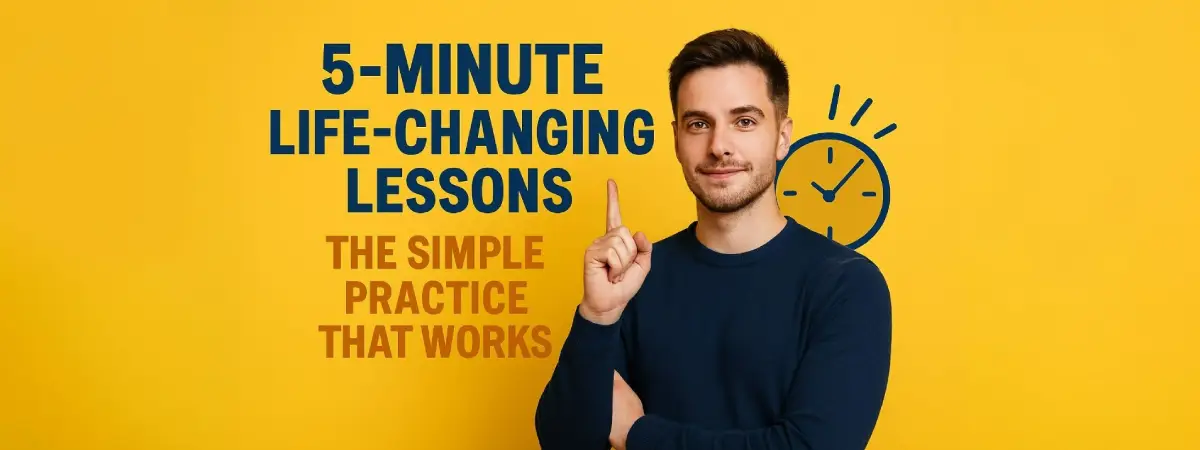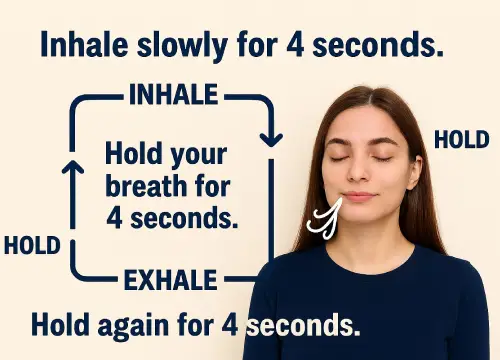5 Minutes Life-Changing lessons: The Simple Practice That Works
September 4, 2025

September 4, 2025

(Life-changing lessons) We often believe life-changing lessons take years to learn. But the truth? Some of the best lessons I’ve ever learned took less than five minutes, and they stuck with me. The smallest shifts can change how we think, feel, and even act every day.
Before we dive in, let me say this: we all get caught up in life. We get hyped over small things, our thoughts get jumbled, and sometimes we snap in anger at the wrong people. It happens we’re human. But that’s why these little five-minute habits are so powerful. They give us tools to pause, reset, and handle life better.
Here are a few that made a big difference for me.
The idea is simple: if a task takes less than two minutes, do it immediately.
Why does this matter?
Because small tasks pile up faster than we realize. Replying to a text, washing a cup, saving a file, or folding a shirt each takes almost no time, but when we put them off, they clutter not just our space but also our minds. Suddenly, we’re staring at an endless to-do list and feeling overwhelmed.
Example:
One morning, I was rushing to leave the house. The sink had a dirty cup, my phone had unread messages, and my desk was messy. Each little thing made me feel more annoyed, and before I knew it, I was snapping at myself for being “late again.” That’s when I tried the 2-Minute Rule. I washed the cup (30 seconds), replied to the messages (a minute), and cleared my desk (another minute). Done. I walked out feeling lighter instead of irritated. That day taught me that procrastination doesn’t just waste time, it eats away at your peace of mind.
We’ve all had days when our heart rate spikes, our minds spiral out of control, and we feel out of control. It happens that, in those moments, we’re getting ourselves worked up, or stressed, or angry. That is where box breathing comes in. It’s a basic, well-established method for resetting your body and mind:
Do this a couple of times, and your body begins to settle down. Your heart rate lowers, your mind clears, and you regain a sense of control.

Example:
I had a sensation of getting winded before a meeting. I felt like my brain was clouded with thoughts like, What if I disappoint everyone? What if they laugh at me? I was about a few seconds away from letting stress ruin it all. Then I closed my eyes and attempted box breathing. Within 30 seconds, my shoulders had become less tense, my breathing rate slowed, and my heartbeat stabilized. I presented calmly and realized just how often we allow stress to nudge us toward anger or panic when peace was just a few breaths away.
When life sends us adversities, there are few of us left who do not wonder, “Why is this happening to me?” That question is what makes us feel helpless, as if we are victims of bad luck. But what if the question were changed? Instead, ask:
This tiny shift in perspective changes how you see problems. They stop being walls and start being lessons.
Example:
A client once canceled a project at the last minute. I was furious. My thoughts were jumbled, and I almost fired off an angry email out of frustration. But then I paused and said to myself: “What can I learn from this?” The answer immediately revealed itself: I had to be clearer about where I stood and nail down deadlines better. That one change spared me from burning a bridge and made me a better professional. What seemed like a defeat became an education.
When life feels overwhelming, anger and frustration often take over. But gratitude is a quick way to pull yourself out of that spiral. The practice is simple: in just five minutes, write down three things you’re grateful for. They don’t need to be big; small joys count too.
Gratitude works because it shifts your focus. Instead of staring at problems, you remind yourself of what’s going right. Science even shows that gratitude rewires the brain to notice positives more naturally.
Example:
One evening, I came home in a terrible mood. The traffic had been bad, my laptop froze, and I was snapping at everything. Out of frustration, I grabbed a notebook and wrote three things I was grateful for: a call from my mom, the smell of rain outside, and a hot dinner waiting for me. The shift was immediate. My problems were still there, but I wasn’t angry anymore. Gratitude gave me perspective and a better evening.
Not everything you do matters equally. The Pareto Principle, or the 80/20 Rule, says that 20% of your actions create 80% of your results. The key is to identify that 20% and give it more of your attention.
For example, a few habits bring most of your health benefits, a few clients bring most of your income, and a few relationships bring most of your happiness. Once you see this, you can stop wasting energy on low-impact activities.
Example:
I used to spend hours scrolling through social media, telling myself it was “work.” By the end of the day, I was frustrated because I had little to show for it. When I looked closely, I realized almost all of my real progress came from just two activities: creating quality content and directly reaching out to people. So I cut back on the noise and focused on those two. The result? More growth, more free time, and less of that angry, “always busy” feeling.
We all get caught up in life. We get hyped, overwhelmed, and sometimes angry at things that don’t even deserve our energy. It’s part of being human.
But here’s the magic: in just five minutes, Life-changing lessons, you can flip the switch. The 2-Minute Rule clears the clutter. Box breathing calms the storm. Changing the question turns problems into lessons. Gratitude resets your mood. And the 80/20 rule gives you focus.
None of these takes hours. They take minutes. But the impact? That can last a lifetime.
So here’s my challenge to you: don’t just read this. Pick one and try it today. Because five minutes might just be all you need to change the way you live tomorrow.